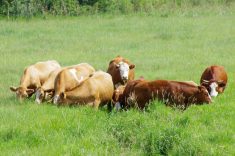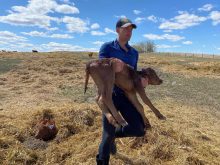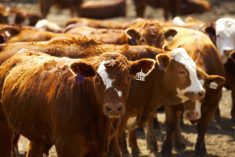Though grain and oilseed prices have fallen dramatically over the past few weeks, it’s clear that’s largely due to fallout from the international credit crisis.
That hasn’t changed the fundamentals of the marketplace. The recovery in production this year has helped move off the knife edge between supply and demand that was talked about so much in the past year, but in the long term it seems farmers will have trouble keeping up with the demands of an ever-growing world population.
Read Also

Cooking fish of Manitoba: Keep your catch fresh and tasty for the table
Fishing in Manitoba provides mouthwatering meals, assuming anglers handle, process and cook their fish properly before sitting down to eat. Here’s how, with recipes and fish preparation tips.
Put simply, there is a need for new sources of protein – sources which effectively provide more protein at lower cost per acre than the current system of raising forage or grain and feeding it to livestock.
Much of the land now devoted to feed grains needs to be converted to pulse crops, and biotechnology now offers the possibility of growing high-protein fungus on cellulose such as straw or even waste paper, effectively producing several times more protein per acre than the conventional crop/livestock system.
If you’re a livestock producer and your blood is starting to boil about now, you can cool off and hold off on picking up the phone to give us a blast.
Instead, pick up the phone and blast the Canadian Cattlemen’s Association, or the federal minister of agriculture, because if you extend their logic, they’re the ones who might ultimately be making the anti-livestock argument.
That came to mind again recently when the World Trade Organization “ruled in favour,” as the minister’s release put it, of Canada and the U. S. in their ongoing battle to allow beef from hormone-treated cattle into the European Union. Let’s see; the WTO generated a news item for EU consumers, telling them that Canada is in bed with the U. S., trying to sell them a product they don’t want. Some favour.
As for the WTO ruling, it simply upheld the right to retaliate against the ban with additional duties on EU imports. It did nothing to change the ban on hormone beef, and the odds of it ever being lifted are slim to none.
But industry and government sure like to keep reminding us how hard they’re bashing their (and cattle producers’) heads against the wall. The U. S. trade representative went even further, dragging out the science argument, stating that the hormones in question are found naturally in other products such as eggs and butter.
Ah, the “science” card. But we’ll bet that we can scientifically prove that beef from Manitoba, Saskatchewan and for that matter, Montana or Australia, is just as safe as beef from Alberta. Why then is Alberta Beef Producers spending so much money advertising Alberta beef? Is it better? Can that be proved scientifically?
No. ABP is spending this money to encourage Albertans to buy from their neighbours, and there is nothing wrong with that. That’s called “marketing,” and it’s the name of the game these days. Three cheers to any other province that does the same.
But at the same time ABP supports the Canadian Cattlemen’s Association in a bid to encourage Europeans to buy beef from several thousand miles away, based on the claim that it’s “safe.”
Sorry, but safety is supposed to be a given for any consumer product, especially food. “Eat Canadian beef – it won’t kill you” is not much of a marketing slogan.
“Neither American or Canadian beef will kill you” is even worse, especially in Europe, where American food practices are not exactly held in high regard.
It would be one thing if there was some hope that this argument might actually make a difference and open the European market to Canadian beef. But no matter what the WTO says, it is not going to happen. Consumers everywhere, and particularly in Europe, buy food for a host of reasons, including taste, nutrition and culture.
Thank goodness for that. It’s still agri-“culture,” not agri-“science.” Farmers must be cautious when playing the “science” card. We don’t want the business of providing food to transfer from the farmers to the scientists and the processors, or we’ll all be getting our protein from fungus grown on cellulose. There’s already such a product on the market. It’s called “Quorn,” grown from a culture of – wait for it – fusarium.
Doesn’t sound too appetizing? Apparently the taste and texture can be similar to meat, and scientifically, it’s been proven perfectly safe. So why not eat that instead of beef?
For many good reasons of course, but those who claim to represent farmers need to come up with better reasons than “it won’t kill you.” Quorn won’t either.
Science is not the facts themselves, but the method of proving them, in a way which can be reproduced time after time. After many tries at the WTO, Canada and the U. S. have reproduced the same result, and scientifically proven that Europe won’t accept hormone beef. If Canada really wants to sell beef to Europe, it’s time for another approach. [email protected]

















